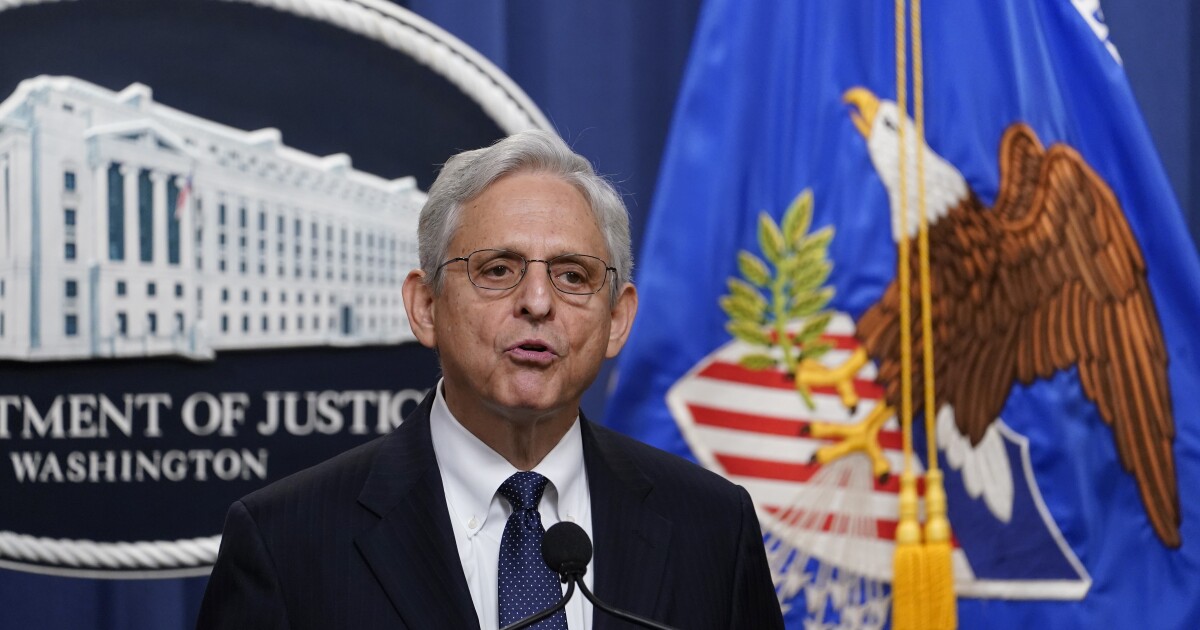

Newly released emails show Delaware U.S. Attorney David Weiss and his team discussed a congressional request last year for information about a Justice Department official with a potential conflict of interest in the Hunter Biden case.
The heavily redacted emails also show that the Justice Department, not Weiss’s office, took the lead on responding to Congress about questions meant for Weiss, despite assurances from Attorney General Merrick Garland that Weiss was operating the Hunter Biden investigation with total independence.
DESANTIS SHOWCASES ABILITY TO GOVERN WITH HURRICANE RESPONSE
Virtually all but the subject of the emails discussing congressional requests about then-Assistant Attorney General Nicholas McQuaid, the Justice Department official with a potential conflict of interest, was redacted by the Justice Department before the agency provided the emails to the Heritage Foundation as part of a Freedom of Information Act lawsuit.
But some of the emails show that the Justice Department’s Office of Legislative Affairs worked on a response to Sens. Chuck Grassley (R-IA) and Ron Johnson (R-WI) and gave Weiss only the opportunity to review the letter it produced, not to draft his own.
The request from Grassley and Johnson to Weiss, which the Justice Department took over, came on May 9, 2022, and focused on McQuaid.
In their letter, Grassley and Johnson noted that Garland had ignored three separate requests for information about the high-ranking DOJ official. McQuaid served as one of the top officials in the DOJ’s Criminal Division until the fall of 2022, putting him in a position to have influence over Hunter Biden’s case during a key period in the investigation.
Prior to joining the Justice Department under President Joe Biden, however, McQuaid was a partner at the law firm handling Hunter Biden’s defense, and before joining the Biden administration, he worked closely with Christopher Clark, who was, until recently, Hunter Biden’s lead defense attorney.
Grassley and Johnson had raised questions about whether McQuaid had recused himself from overseeing a probe to which he was so closely tied from his time in private practice. By May of last year, they’d grown frustrated enough to ask Weiss for answers about McQuaid, including whether anyone in the Delaware U.S. attorney’s office had had contact with him during the course of their Hunter Biden investigation.
The Justice Department had hinted in a letter to Grassley and Johnson in February 2021 that McQuaid may have recused himself from the Hunter Biden case, although the agency did not say for certain, nor did it provide a recusal memo.
“[T]he Acting Assistant Attorney General is screened and recused from matters in which he has a financial interest or a personal business relationship, including matters involving his former law firm,” the DOJ had written in its letter.
McQuaid appeared to depart the Justice Department less than a month before Weiss held a meeting with investigators on the Hunter Biden investigation and informed them that the Justice Department had denied his request for special counsel status. He also said two other Joe Biden-appointed U.S. attorneys had blocked his ability to charge Hunter Biden outside Delaware, according to two IRS whistleblowers who approached Congress this spring.
McQuaid is now once again a lawyer at Latham & Watkins, a firm helping to defend Hunter Biden against the criminal charges he may soon face.
“McQuaid did not represent Hunter Biden nor have any involvement in the matter when he was a partner at Latham prior to joining the Department of Justice in 2021,” a Latham & Watkins spokesperson told the Washington Examiner. “He also had no involvement in the Hunter Biden investigation while he was at the DOJ, and he has not represented Mr. Biden since returning to Latham.”
At least three of Hunter Biden’s defense attorneys currently work at Latham & Watkins, and Clark did as well until he left the firm in April to start his own.
Clark withdrew from Hunter Biden’s defense team in anticipation of serving as a witness in a potential future challenge to the way Weiss’s office handled the botched plea agreement it attempted to offer Hunter Biden in June.
The DOJ provided the emails involving Weiss as part of a FOIA lawsuit the Heritage Foundation’s Oversight Project filed earlier this year.
Kyle Brosnan, chief counsel at Heritage’s Oversight Project, said the lawsuit seeks any documents related to the prospect of Weiss requesting special counsel status, as well as any documents related to Weiss’s attempts to bring charges against Hunter Biden outside his jurisdiction in Delaware.
Brosnan said the emails suggest Weiss was not permitted by the DOJ to answer questions about his work.
“That significantly undercuts all the statements Attorney General Garland has made swearing up and down that Weiss’s investigation was independent,” Brosnan told the Washington Examiner.
Justice Department officials found more than 2,500 documents responsive to the FOIA request, the DOJ said in a court filing during the FOIA lawsuit.
Many of the documents, such as the 27 pages of emails provided by the DOJ on Friday to the Heritage Foundation, are likely to be heavily redacted.
But the emails are still significant because, whatever they do contain under the redactions, they are related to discussions Weiss and his prosecutorial team had about the constraints placed on his office by the Justice Department. And the multiple congressional inquiries about McQuaid and other aspects of the Hunter Biden investigation appear to have sparked those discussions.
President Joe Biden appointed McQuaid to his position at the DOJ Criminal Division on his first day in office. That appointment quickly prompted scrutiny because Hunter Biden had hired Clark – who, like McQuaid, was a partner at Latham & Watkins at the time – to represent him one month earlier.
CLICK HERE TO READ MORE FROM THE WASHINGTON EXAMINER
The DOJ appears to have done little to address concerns about the role McQuaid may or may not have played in the Hunter Biden investigation beyond the Feb. 2021 letter confirming that McQuaid had received ethics training and would hypothetically recuse himself from matters involving Latham & Watkins.
During his tenure at the Justice Department, McQuaid visited the White House at least three times, White House visitor logs show.





